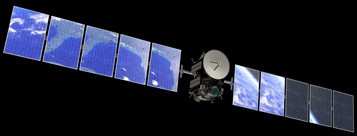Sun, Nov 23, 2008
Probe Powers Down Its Ion Drive As Scheduled
NASA's Dawn spacecraft shut down its ion propulsion system
Thursday as scheduled. The spacecraft is now gliding toward a Mars
flyby in February of next year.

"Dawn has completed the thrusting it needs to use Mars for a
gravity assist to help get us to Vesta," said Marc Rayman, Dawn's
chief engineer, of NASA's Jet Propulsion Laboratory, Pasadena, CA.
"Dawn will now coast in its orbit around the sun for the next half
a year before we again fire up the ion propulsion system to
continue our journey to the asteroid belt."
Dawn's ion engines may get a short workout next January to
provide any final orbital adjustments prior to its encounter with
the Red Planet. Ions are also scheduled to fly out of the
propulsion system during some systems testing in spring. But
mostly, Dawn's three ion engines will remain silent until June,
when they will again speed Dawn toward its first appointment, with
asteroid Vesta.
Dawn's ion engines are vital to the success of the misson's
8-year, 3-billion-mile journey to asteroid Vesta and dwarf planet
Ceres. One of these extremely frugal powerhouses can generate more
than 24 hours of thrusting while consuming about 9 ounces of the
spacecraft's xenon fuel supply -- less than the contents of a can
of soda. Over their lifetime, Dawn's three ion propulsion engines
will fire cumulatively for about 50,000 hours (over five years) --
a record for spacecraft.
Dawn will begin its exploration of asteroid Vesta in 2011 and
the dwarf planet Ceres in 2015. These two icons of the asteroid
belt have been witness to so much of our solar system's history. By
utilizing the same set of instruments at two separate destinations,
scientists can more accurately formulate comparisons and contrasts.
Dawn's science instrument suite will measure shape, surface
topography, tectonic history, elemental and mineral composition,
and will seek out water-bearing minerals. In addition, the Dawn
spacecraft itself and how it orbits both Vesta and Ceres will be
used to measure the celestial bodies' masses and gravity
fields.
The Dawn mission to asteroid Vesta and dwarf planet Ceres is
managed and operated by JPL for NASA's Science Mission Directorate,
Washington, DC.
More News
Option Approach An approach requested and conducted by a pilot which will result in either a touch-and-go, missed approach, low approach, stop-and-go, or full stop landing. Pilots >[...]
"Emirates is already the world's largest Boeing 777 operator, and we are expanding our commitment to the program today with additional orders for 65 Boeing 777-9s. This is a long-t>[...]
(Pilot) Reported That There Was A Sudden And Violent Vibration Throughout The Airplane That Lasted Several Seconds Analysis: The pilot was returning to his home airport at an altit>[...]
“This recognition was evident during the TBMOPA Annual Convention, where owners and operators clearly expressed their satisfaction with our focus on customer service, and enc>[...]
Overhead Maneuver A series of predetermined maneuvers prescribed for aircraft (often in formation) for entry into the visual flight rules (VFR) traffic pattern and to proceed to a >[...]
 ANN's Daily Aero-Term (11.19.25): Option Approach
ANN's Daily Aero-Term (11.19.25): Option Approach Aero-News: Quote of the Day (11.19.25)
Aero-News: Quote of the Day (11.19.25) NTSB Final Report: Sting Sport TL-2000
NTSB Final Report: Sting Sport TL-2000 Aero-News: Quote of the Day (11.20.25)
Aero-News: Quote of the Day (11.20.25) ANN's Daily Aero-Term (11.20.25): Overhead Maneuver
ANN's Daily Aero-Term (11.20.25): Overhead Maneuver



